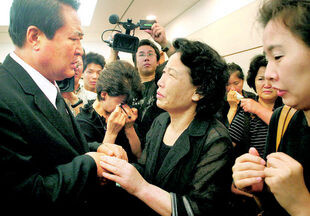hankyoreh
Links to other country sites 다른 나라 사이트 링크
U.S. involvement in hostage crisis: political manipulation or essential participation?

A controversy has arisen in the nation’s political arena surrounding the “U.S. role” in the lengthening hostage crisis, after 23 South Koreans were kidnapped by Taliban insurgents more than two weeks ago. The nation’s liberal and conservative parties have vastly different views on the matter, with the former pushing for greater U.S. involvement and the latter calling for a more prudent approach. Accusations have been traded on both sides, with each side criticizing the other of politically motivated manipulation of the crisis. Family members of the hostages, however, continue to appeal to politicians to stop the disputes and their main concern is that the anti-U.S. debates will have a negative effect on the hostage standoff.
On August 3, the hostages’ family members urged politicians not to use the hostage crisis for political and ideological purposes. Cha Sung-min, the families’ representative, stressed, “We are urging the U.S. to intervene in the crisis and to play a role, but only to save the lives of those who have been kidnapped. In these circumstances, some are interpreting the situation as being either ‘anti-U.S.’ or an objection to those who are against U.S. involvement, essentially distorting the crisis.”
Seo Jeong-bae, the father of two of the hostages, Myeong-hwa and Gyeong-seok, said, “As the Foreign Ministry has confirmed, the U.S. is holding the key to the crisis. Some worry that our request will be considered anti-U.S., but we should save the hostages by any means necessary.”
The conservative Committee to Promote the Nation’s Reform maintained, “Liberal organizations have started to foster anti-U.S. sentiment by blaming the U.S. for the crisis. It seems that their real purpose is focused on promoting anti-U.S. sentiment while re-energizing the progressive forces.”
Meanwhile, the main opposition Grand National Party has taken a somewhat ambiguous position. The GNP is very careful to not let the dialogue on the U.S. role cause a shift to an anti-U.S. atmosphere. It recently participated in a National Assembly delegation sent to the United States to appeal for U.S. cooperation in the matter and it is likely that this has effected the party’s current position on the issue.
Rep. Lee Byung-suk of the GNP said, “National division of any kind will not be helpful in the hostage crisis. I would like to clarify that the visit of National Assembly representatives to the U.S. is aimed at asking for Washington’s cooperation in the efforts to rescue the abductees.”
During a briefing held yesterday, Rep. Kang Sung-man of the GNP said, “We think that the leftist groups are fostering anti-U.S. sentiment ahead of the presidential election. It is essential to closely cooperate with the U.S., but the U.S. does not have the answer to the crisis. We cannot criticize the U.S. in an irresponsible manner.”
Emphasis on the U.S. role has intensified because South Korea initially sent troops to Afghanistan at the request of the United States; as a result, South Koreans were the targets in the recent kidnapping. However, those who maintain that the United States bears primary responsibility for the crisis seem to be doing so just to urge the United States to intervene.
Shim Sang-jung, a presidential hopeful from the progressive Democratic Labor Party (DLP) issued a statement recently, saying, “It is natural to demand that the U.S. play a role, and to urge the U.S. to take practical measures to end the crisis, because the U.S. holds the key to the crisis. Those who are spreading anti-U.S. sentiment are damaging the credibility of those who are making an effort to release the hostages.”
Meanwhile, Rep. Kim Jin-pyo of the ruling Uri Party said, “It is senseless to belittle the nation’s efforts to ask for U.S. cooperation as a plot to promote an anti-U.S. movement.”
Editorial・opinion
![[Column] Season 2 of special prosecutor probe may be coming to Korea soon [Column] Season 2 of special prosecutor probe may be coming to Korea soon](https://flexible.img.hani.co.kr/flexible/normal/500/300/imgdb/original/2024/0426/3317141030699447.jpg) [Column] Season 2 of special prosecutor probe may be coming to Korea soon
[Column] Season 2 of special prosecutor probe may be coming to Korea soon![[Column] Park Geun-hye déjà vu in Yoon Suk-yeol [Column] Park Geun-hye déjà vu in Yoon Suk-yeol](https://flexible.img.hani.co.kr/flexible/normal/500/300/imgdb/original/2024/0424/651713945113788.jpg) [Column] Park Geun-hye déjà vu in Yoon Suk-yeol
[Column] Park Geun-hye déjà vu in Yoon Suk-yeol- [Editorial] New weight of N. Korea’s nuclear threats makes dialogue all the more urgent
- [Guest essay] The real reason Korea’s new right wants to dub Rhee a founding father
- [Column] ‘Choson’: Is it time we start referring to N. Korea in its own terms?
- [Editorial] Japan’s rewriting of history with Korea has gone too far
- [Column] The president’s questionable capacity for dialogue
- [Column] Are chaebol firms just pizza pies for families to divvy up as they please?
- [Column] Has Korea, too, crossed the Rubicon on China?
- [Correspondent’s column] In Japan’s alliance with US, echoes of its past alliances with UK
Most viewed articles
- 1‘We must say no’: Seoul defense chief on Korean, USFK involvement in hypothetical Taiwan crisis
- 2[Column] Season 2 of special prosecutor probe may be coming to Korea soon
- 3N. Korean delegation’s trip to Iran shows how Pyongyang is leveraging ties with Moscow
- 4Amnesty notes ‘erosion’ of freedom of expression in Korea in annual human rights report
- 5[Reportage] On US campuses, student risk arrest as they call for divestment from Israel
- 6Korea sees more deaths than births for 52nd consecutive month in February
- 7[Editorial] New weight of N. Korea’s nuclear threats makes dialogue all the more urgent
- 8‘Weddingflation’ breaks the bank for Korean couples-to-be
- 9[Column] Has Korea, too, crossed the Rubicon on China?
- 10[Column] Park Geun-hye déjà vu in Yoon Suk-yeol